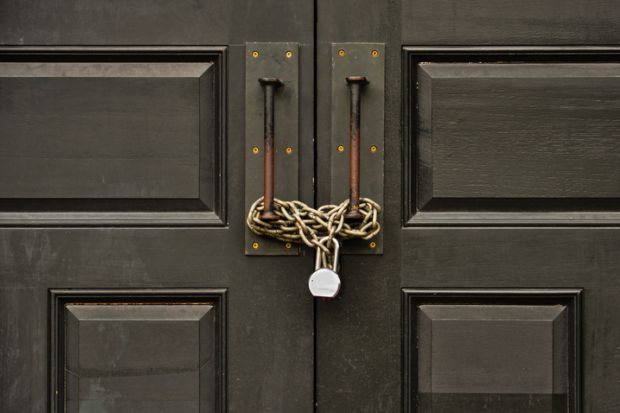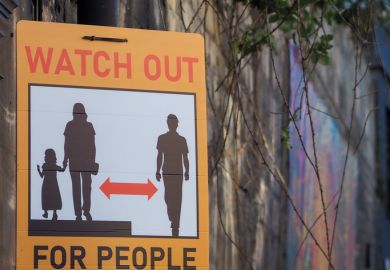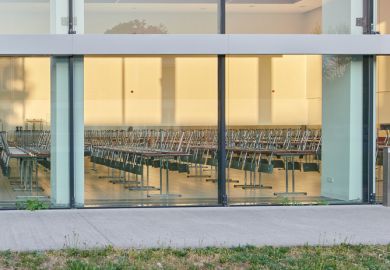Evidence abounds that the opening of campuses at a time of rising infection rates is ill-advised.
The UK Government and the Independent Sage Group of experts are united in their concern. The University and College Union has very firmly embraced these warnings, advocating that “online teaching must be universities’ default position”. And the evidence for the wisdom of that position is only mounting.
The argument is almost excruciatingly obvious. The arrival of hundreds of thousands of students from innumerable national and international localities into university towns and cities will only exacerbate the escalation of infections – and risk the relationship between town and gown.
The US example already provides some warning, with numerous examples of campuses reopening (despite “die-ins” by protesting faculty and students) only to have to close again.
The UK government has blamed the imprudence of youth for the increasing infection rate. These supposedly aberrant behaviours are an integral component of the social education offered by universities, yet now students must not act as students, and it is universities’ responsibility to stop them.
The UK governments’ latest restrictions on indoor gatherings – the so-called “rule of six” – will make freshers’ fortnight a distinctly sober affair. Some celebrate the reduction of the role of alcohol in social bonding, but can students really be expected to stick to the rules? And can universities really be expected to force them?
When the inevitable Covid-19 spikes hit campuses, the government would prefer that students barricade themselves in their dormitories rather than, as in March, go back home. Yet how will universities – or, more specifically, beleaguered faculty and bare-bones student support services – cope when demands for pastoral care go into overdrive? With what are reported to be poorly defined relationships between universities and underfunded local public health teams and the calamity of a somewhat less than world-beating test-and-trace system, things could get very messy.
Universities are being forced to make good on the deal they struck with applicants, whereby incoming students spend out on accommodation and extensive related costs in exchange for a full campus experience. Yet the growing sense is that this is a bad deal that will likely be reneged upon. The question is how quickly universities will become mausoleums of broken promises.
The tragedy is that none of this is necessary. Teaching staff – or, at least, those lucky enough not to suffer the cleaver of panic redundancies – found ways to make the best of the pandemic situation. Despite all the anxieties and technicalities, most lecturers have successfully made a transition to remote teaching. It may not be entirely optimal, but it has been demonstrated that students can still have a rich and valuable learning experience online.
Hence, unlike a recent article in these pages, we should not confuse the continuation of online learning and teaching with the vandalisation of the university ideal. Nor should we shy away from the opportunity to sustain university communities in ways that are uninhibited by time, place and space. Although a recent history of prolific capital investment would suggest otherwise, the substance of the university community is far more than the materiality of its estates.
Of course, staying online is not without issues. There are many reasonable and well-founded pedagogical and professional concerns. Yet young people are not nearly so invulnerable to the immediate and long-term effects of Covid-19 as is commonly supposed, and the dangers of the virus comingling with seasonal influenza or even meningitis are not yet fully determined. Any attempt to make good on empty promises of open campuses is ethically fraught – especially where that promise derived not from pedagogical concern but the binds of marketisation.
Perhaps worst of all, if universities continue to follow a strategy of in-person teaching, the effects will be unequally experienced. More junior academics may feel less able to contest institutional mandates and managerial pressures to show up in person, with those on insecure contracts particularly powerless to resist.
The concerns may prove academic if the infection rate escalates to such an extent that reopening campuses becomes unfeasible even before the start of term – perhaps even prompting government to extent its rule of six to seminar rooms. Notwithstanding, the current situation underlines the fact that the ethic of care – for staff as well as students – that ought to inform university management is sadly lacking.
Ultimately, there can be no accusation of broken promises by academics who have and will continue to give their all in the safe space of remote learning and teaching – even in subjects in which the task is particularly arduous. We are in the midst of a pandemic and we all need to proceed as rationally, cautiously and compassionately as we can. Reopening university campuses falls some way short of that rationale.
Richard Watermeyer is professor of higher education at the University of Bristol.
Register to continue
Why register?
- Registration is free and only takes a moment
- Once registered, you can read 3 articles a month
- Sign up for our newsletter
Subscribe
Or subscribe for unlimited access to:
- Unlimited access to news, views, insights & reviews
- Digital editions
- Digital access to THE’s university and college rankings analysis
Already registered or a current subscriber?










